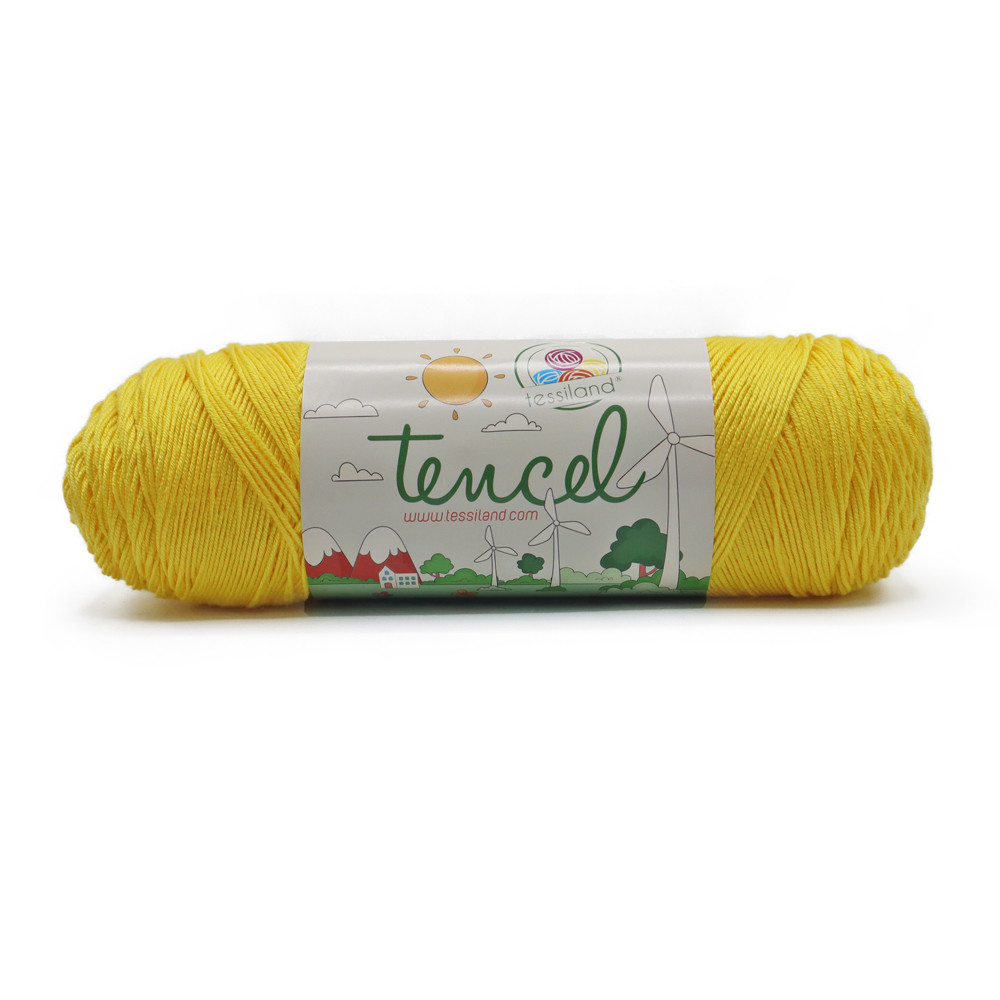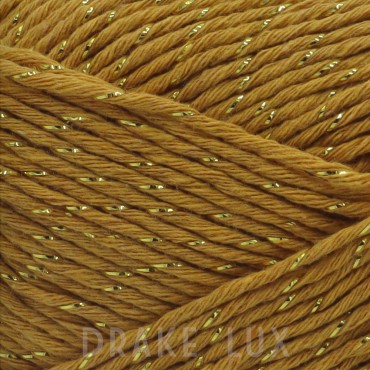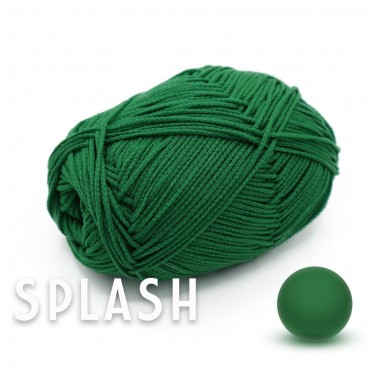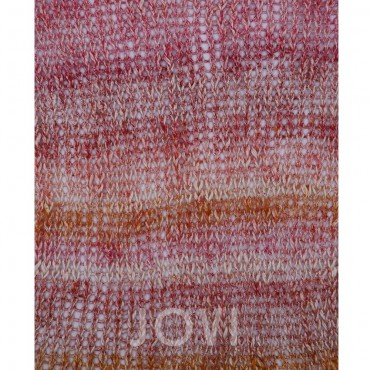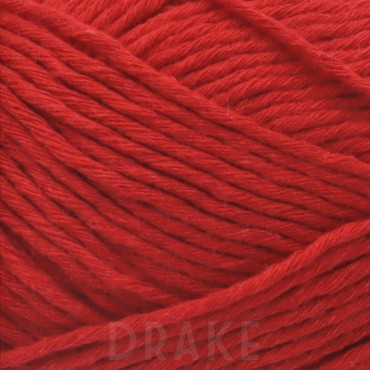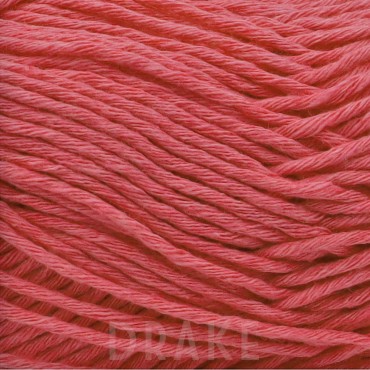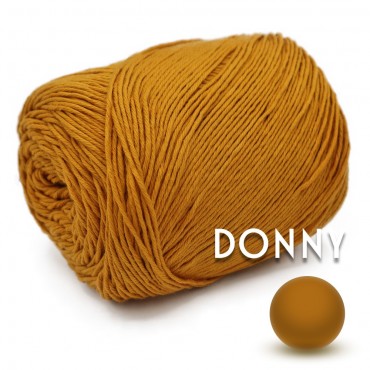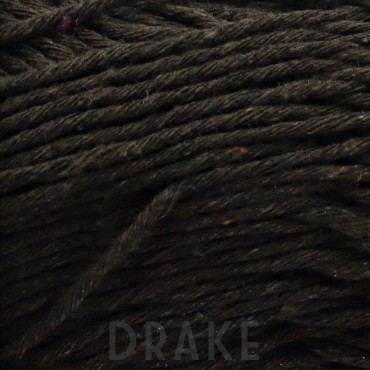Tencel Yellow Grams 200
Ecological yarn made from wood fiber. Eco-sustainable, soft, and shiny twisted yarn with innovative breathable properties. Composition 100% Lyocell (Tencel®). Oeko Tex® certified. Weight 200 grams, Length 450 meters. Recommended needles size 4-5, Crochet 3-4. [P.ta 3888]
-
 Top quality products
Top quality products
-
 Free shipping for orders over €19 in Italy and €59 in Europe
Free shipping for orders over €19 in Italy and €59 in Europe
-
 You can return the product within 30 days
You can return the product within 30 days
Everything About Tencel®: A Complete Guide
Tencel has become a keyword in the world of textiles and sustainable fashion. But what do we really know about this revolutionary fiber? In this description, we will explore every aspect of Tencel, from its origins to its applications, highlighting why it has become such a popular choice.
Introduction to Tencel
What is Tencel?
Tencel is a registered trademark representing a fiber known as lyocell. Produced mainly from the wood pulp of trees like eucalyptus and beech, Tencel is praised for its ecological and sustainable properties.
History and Origins
The story of Tencel began in the 1990s, when it was first developed as a sustainable alternative to traditional fibers. Since then, it has grown in popularity, becoming a cornerstone in the field of ecological fashion.
Characteristics and Benefits
Sustainability and Environmental Impact
One of the most attractive aspects of Tencel is its sustainability. The production process uses a closed method, recycling water and solvents and significantly reducing environmental impact.
Comfort and Breathability
In addition to its eco-friendliness, Tencel is known for its exceptional comfort. Soft on the skin and highly breathable, it is ideal for "skin-contact" garments.
Versatility of Use and Maintenance
Tencel can be combined with other fibers such as cotton and wool, increasing its versatility. This makes it suitable for a wide range of applications, from fashion to home decor.
Maintenance of Tencel
Here are some useful tips for washing Tencel fabrics:
- Always Read the Label: Before washing any Tencel garment, it's crucial to carefully read the label for specific washing instructions. Some items may require delicate washes or special precautions.
- Hand Washing or Machine Washing: Tencel can generally be washed either by hand or in a washing machine. If using a machine, it's advisable to set a gentle cycle and use cold water to prevent fabric shrinkage.
- Use Mild Detergents: Choose a mild detergent, preferably one specifically for delicate fabrics. Avoid using bleach or harsh detergents that can damage the fibers.
- Avoid Excessive Twisting and Stretching: When hand washing, avoid twisting or stretching the fabric excessively as this could damage it. Gently squeeze out the water without twisting.
- Drying: To dry Tencel, it's preferable to lay it flat, avoiding direct sunlight that can fade the color or heat sources. If using a dryer, choose a low-temperature setting.
- Ironing: If necessary, Tencel can be ironed at low temperatures. It's advisable to use a cotton cloth between the iron and the garment to protect it from direct heat.
- Store Carefully: Once dry, store the Tencel garment folded or hung in a cool, dry place to maintain its shape and quality.
Remember that proper care of Tencel fabrics not only preserves their look and feel but also contributes to their longevity, maintaining their ecological and sustainable qualities.
FAQ
1. What Makes Tencel Different from Other Fibers? Tencel stands out for its sustainable production, exceptional comfort, and biodegradability, significantly differing from traditional fibers.
2. Is Tencel Suitable for All Skin Types? Yes, Tencel is known to be hypoallergenic and gentle on the skin, making it suitable for almost all skin types.
3. How Does Tencel Compare to Cotton in Terms of Environmental Impact? Tencel has a much lower environmental impact compared to cotton, as it requires less water and pesticides during its production.
4. Can Tencel Products Be Recycled? Yes, Tencel products can be recycled or decompose naturally, unlike many synthetic fibers.
5. Where Can I Find Tencel Products? Tencel products are available in many fashion and home decor stores, both physical and online... but if you are interested in Tencel for crochet, this novelty in Italy is offered by Tessiland!
The Production Process
From Wood Pulp to Fabric
The process of transforming wood pulp into Tencel is a miracle of modern technology. Using innovative methods, Tencel is produced efficiently and environmentally friendly.
Innovation and Technology
Tencel production is at the forefront of the textile industry. With a constant commitment to innovation, it continues to set new standards for sustainable production.
Applications of Tencel
In the World of Fashion
In the fashion industry, Tencel is rapidly gaining ground as an eco-friendly alternative to cotton and synthetic fibers. Its popularity is growing among brands seeking to reduce their ecological footprint.
Use in the Furnishing Sector
The furnishing industry is also starting to recognize the benefits of Tencel. Its durability and comfort make it ideal for furnishing fabrics and bed linens.
Tencel vs Other Fibers
Comparison with Cotton
Compared to cotton, Tencel offers advantages in terms of both sustainability and comfort. While cotton requires large amounts of water for its production, Tencel is much more resource-efficient.
Comparison with Synthetic Fibers
Unlike synthetic fibers, which are often derived from petroleum, Tencel is completely biodegradable and has a much lower environmental impact.
Ethical and Market Considerations
The Role in the Future of Sustainable Fashion
Tencel is playing a crucial role in shaping the future of sustainable fashion. With increasing environmental awareness, its role is likely to become even more central in the coming years.
Challenges and Opportunities
Despite its popularity, Tencel still faces challenges such as production costs and the need for greater consumer awareness. However, these challenges also represent opportunities for further innovation and growth.
Conclusions
The Future of Tencel
Looking to the future, Tencel has the potential to become a key component of the global textile industry. With its unique combination of sustainability, comfort, and versatility, Tencel is well positioned to lead the sustainable fashion revolution.
Why Choose Tencel?
In conclusion, Tencel is not just an ecological choice but also a smart choice for those seeking high-quality fabrics that are comfortable, durable, and versatile. Whether it's fashion or furnishings, Tencel represents an excellent balance between ethics and aesthetics.
Related to the displayed articles
16 other products in the same category:
Recycled Ecological Cotton Ball with delicate lurex insert. Composition 97% Cotton 3% metallic fiber. 100% Sustainable Certified BCI and GRS Certified Oeko tex® Weight Grams 50 Length Meters 125 approx. Recommended Needles 4-5 Crochet Hook 3-4. [P.ta SB32400]
100% Made in Italy stretch yarn for swimwear and summer tops. Composition 100% Microfiber Polyamide Weight 50 Grams Length about 175 Meters. We suggest you to use: Knitting needles 4-5 Hook 3-3.5 [P.ta 2043]
Ball of slub cotton. Composition 100% Cotton. Weight 50 grams Length 145 meters approx. Recommended:Needles 4-5 Crochet 3-4 [P.ta 8722]
Soft and bright ball of cotton yarn. Composition 100% Cotton. Oeko Tex® certified. Weight 50 Grams Length about 125 Meters. We suggest you to use Knitting needles 3-3.5 Hook 2.5-3 [P.ta 2207]
Yoko Cotton is a spring-summer yarn made from natural cotton, enriched with a thin thread of multicolor sequins that create a shiny, original, and trendy effect. Its composition — 40% cotton, 60% polyester — offers both lightness and structure, perfect for tops, shirts, and fashionable garments to wear with style. Each 50g ball measures 115 meters....
Diana Cotton is a blended yarn made of 45% cotton, 40% polyester, 10% polyamide, and 5% metallic fiber. Enriched with a lurex thread, it features an elegant and subtle texture thanks to delicate gold and silver lamé speckles. Soft, lightweight, and radiant, it’s perfect for garments and accessories to wear in spring and summer. Each 50g skein contains 115...
Recycled Ecological Cotton Yarn. Composition: 100% cotton. 100% sustainable with BCI and GRS certification, and Oeko tex® certification. Weight 50 grams, Length approximately 125 meters. Recommended Needles 4-5 mm, Hook 3-4 mm. [P.ta SB32416]
Yarn in reel with lurex inserts. Composition 55% Cotton 20% Polyester 9% Polyamide 12% metallic fiber, 4% other fibers. Weight 250 grams, Length 450 meters. Recommended needles 6-8, Crochet 5-7. [P.ta R2385902]
Soft and bright ball of cotton yarn. Composition 100% Cotton. Oeko Tex® certified. Weight 50 Grams Length about 125 Meters. We suggest you to use Knitting needles 3-3.5 Hook 2.5-3 [P.ta 2301]
Soft and bright ball of cotton yarn. Composition 100% Cotton. Oeko Tex® certified. Weight 50 Grams Length about 125 Meters. We suggest you to use Knitting needles 3-3.5 Hook 2.5-3 [P.ta 2301]
Recycled Ecological Cotton Yarn. Composition: 100% cotton. 100% sustainable with BCI and GRS certification, and Oeko tex® certification. Weight 50 grams, Length approximately 125 meters. Recommended Needles 4-5 mm, Hook 3-4 mm. [P.ta SB32405]
Plain color ball of cotton. Composition 100% Cotton. Weight 100 Grams Length about 250 Meters. We suggest you to use: Knitting needles No. 4-5 Hook No. 3-4. [P.ta 3253]
Ecological yarn made from wood fiber. Eco-sustainable, soft, and shiny twisted yarn with innovative breathable properties. Composition 100% Lyocell (Tencel®). Oeko Tex® certified. Weight 200 grams, Length 450 meters. Recommended needles size 4-5, Crochet 3-4. [P.ta 0997]
Recycled Ecological Cotton Yarn. Composition: 100% cotton. 100% sustainable with BCI and GRS certification, and Oeko tex® certification. Weight 50 grams, Length approximately 125 meters. Recommended Needles 4-5 mm, Hook 3-4 mm. [P.ta SB41182]
Soft and bright ball of cotton yarn. Composition 100% Cotton. Oeko Tex® certified. Weight 50 Grams Length about 125 Meters. We suggest you to use Knitting needles 3-3.5 Hook 2.5-3 [P.ta 2301]
Plain Color ribbon cone. Composition 60%Cotton 40%Acrylic. Weight grams 250 Length about 500 Meters. We suggest you to use Knitting Needles 6-8 Hook 5-7. [P.ta R1329001]

